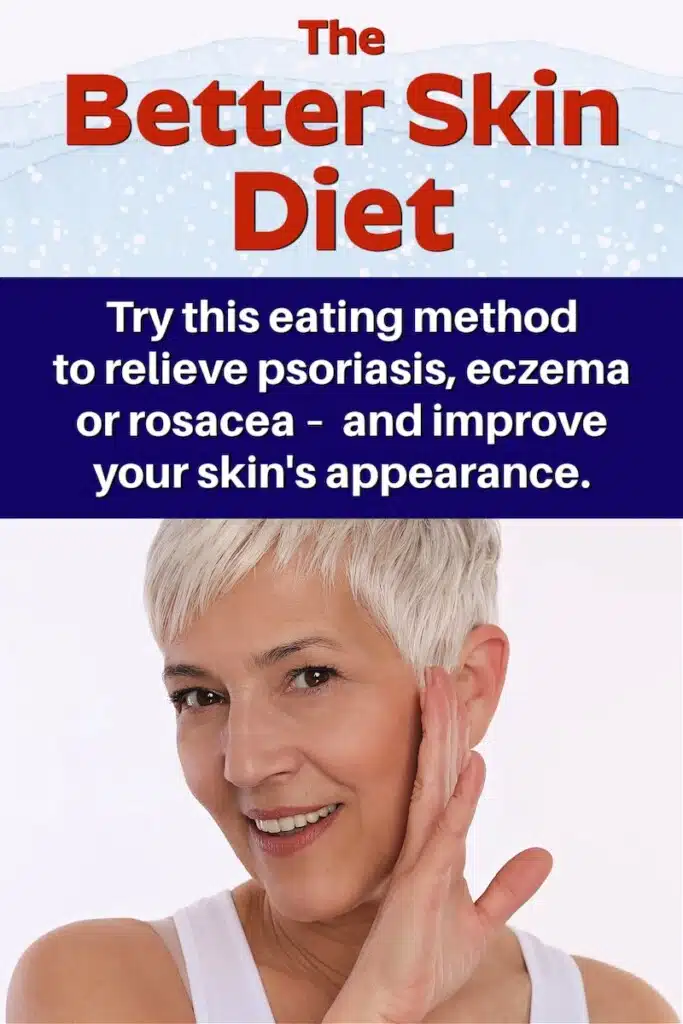Psoriasis, eczema, and rosacea are chronic skin conditions caused by an autoimmune response in the human body. Strategic nutrition in the form of an anti-inflammatory diet can often prove helpful in reversing symptoms and improving the appearance and health of skin.
An autoimmune response is when your immune system is so fatigued that it loses its ability to distinguish healthy tissue from compromised tissue clearly.
With autoimmune, calibration is off, and your immune system can fluctuate between being underactive and overactive. When skin cells grow too quickly, new cells will pile up – forming itchy, inflamed, scaly plaques.
The Difference Between Psoriasis, Eczema, and Rosacea
Though each of these skin conditions presents in slightly different ways, they are all symptoms of inflammation:
- Psoriasis is a build-up of red patches.
- Rosacea is scaly face patches, usually on the nose and cheeks, that present as flushing.
- Excema is itchy patches found on the front of the neck, inside the elbows, or behind the knees.
Beyond genetics, what triggers an autoimmune response in the skin differs from person to person.
The best way to determine the trigger is to eliminate particular foods, habits, or environmental stressors one by one until culprits can be identified.
An anti-inflammatory diet focuses on whole, nutrient-dense foods that can help reduce inflammation in the body. Here are some examples of typical foods that a person can eat to follow an anti-inflammatory diet:
- Vegetables: Leafy greens (like spinach and kale), broccoli, cauliflower, sweet potatoes, and bell peppers. Up to 9 loose cups of multi-colored vegetables daily!
- Healthy Fats: Olive oil, avocados, and fatty fish (such as salmon, mackerel, and sardines) rich in omega-3 fatty acids.
- Proteins: Lean sources of protein like poultry, tofu, and tempeh.
- Herbs and Spices: Turmeric, ginger, garlic, and cinnamon, which have natural anti-inflammatory properties.
- Beverages: Green tea and herbal teas, which contain antioxidants.
- Dairy Alternatives: Unsweetened almond milk, coconut milk, or other plant-based milk alternatives.
- and these Foods in Smaller Doses: Fruit (berries, such as blueberries and raspberries), Nuts and Seeds (almond, brazil, walnut), and legumes (lentils, chickpeas, and beans).
The key is to avoid or limit processed foods, sugary snacks, alcohol, refined carbohydrates, and excessive intake of fried foods or red meat, as these can contribute to inflammation in the body. An anti-inflammatory diet is more about what you don’t eat.
Ideas for Improving Your Skin Health and Reversing Symptoms
In addition to consulting a dermatologist, a DNA test can be helpful. It will tell you which genes you possess that might activate your condition.

For example, a DNA test might tell you that you not only have a 95% greater chance of having psoriasis than the average person but, more specifically, which specific gene variant you have and what its best solution is (for example, doing sunlight therapy, or eliminating beer, or quitting cigarettes, or using coal tar ointment, etc.).
An affordable way to reduce symptoms from chronic skin conditions is to stop the problem at its source – your cells. Adopting an anti-inflammatory diet can gradually improve cellular health and lessen the frequency and severity of autoimmune responses that negatively impact the skin.
Eating an Anti-Inflammatory Diet to Help Your Skin Look and Feel Better
An anti-inflammatory diet is a method of eating inspired by our Upper Paleolithic ancestors, except that it strongly emphasizes vegetables while simultaneously deemphasizing nightshades and other foods higher in lectins and molds.
It involves tracking calories, macros, and inflammation (in a strategic sequence) and removing particular inflammatory foods (in a specific sequence).
Once you achieve your target weight, you can experiment with implementing a once-a-week Cheat Day, during which you can have your favorite “offending” foods.
Reversing Symptoms of Psoriasis, Eczema, and Rosacea
A benefit of following an anti-inflammatory diet is that one tends to lose excess weight.
Since obesity can increase the odds – and worsen the symptoms – of inflammatory skin conditions such as psoriasis, eczema, and rosacea, weight loss can therefore be helpful:
- Sugar can trigger flare-ups. Excess consumption of simple sugars (glucose, fructose, and sucrose) can contribute to autoimmune skin symptom severity.
- Omega-3s and antioxidants can be helpful to skin tissue. Polyunsaturated fatty acids from the omega−3 family have an anti-inflammatory effect, while excess consumption of omega−6s can trigger flare-ups.
- Eating gluten-free can prove helpful to many people with psoriasis, eczema, or rosacea.

- Taking an astaxanthin pill three times a week might be beneficial (ask your doctor first). Astaxanthin is a marine carotenoid with red pigment – and the most stable of all carotenoids. According to researchers at Examine.com, it’s touted to aid eye health. It also seems to reduce oxidative stress markers and might reduce LDL and DNA oxidation damage, making it potentially suitable for circulatory health, anti-aging, and photoprotection. Studies on astaxanthin have indicated a reduction in wrinkles and improvement in elasticity, roughness, and texture (skin elasticity in the cheek and crow’s feet was significantly improved, and age spots were reduced).
Interestingly, dry or cold weather might exacerbate autoimmune skin conditions.
Psoriasis, eczema, or rosacea could be experienced in conjunction with joint stiffness, and people with autoimmune skin conditions might also tend to have problems with their kidneys, heart, and joints.
Typical ages for autoimmune skin condition onset are:
- Psoriasis can appear at any age – but many cases develop between the ages of 15-20 or 55-60.
- Eczema generally appears in children before age 5. Kids usually grow out of it, so if you experience eczema as an adult, consult your medical doctor.
- Rosacea most often appears after middle age.
This site, Over Fifty and Fit, is independent. Within this site, I provide resources about nutrition, exercise, and self-care to help you attain new fitness goals.
Over Fifty and Fit does not provide medical advice, diagnosis, or treatment. If you believe you might have any of the skin conditions listed in this article, seek out the advice of your medical doctor. If there’s a difference between what this site discusses and what your doctor says, listen to your doctor. Your doctor knows you better.
I’m Dane Findley, and my passion is sharing inspiring information about fitness and dieting that is longevity-focused, purpose-driven, and physique-enhancing.
Are you over the age of 45?
You might find the Silver & Strong Course extremely helpful:
- strategic nutrition and exercise plan
- for men and women
- for all levels and body types
- provides sequenced action steps
- includes specific lifestyle protocols
- get sculpted muscle
- reduce fat deposits around the waist
- improve joint mobility
- increase stamina
- appear healthier and more youthful
The coursebook’s foundation is taking action toward adopting an anti-inflammatory lifestyle, particularly regarding diet. (It’s not just about fitness.)
In Silver and Strong: Getting Fit After Age 50, I explain exactly how to craft a Fitness Comeback Plan that specifically meets the needs of your unique body and lifestyle:
- Need more info first? Click Here.
- Want the course now? Click Here.
Many experienced health professionals believe that skin is the last to receive nutrients in the body, yet the first to show signs of imbalance. In that sense, skin can make an effective barometer for a body’s current strengths and weaknesses.
Additional Sources and Recommended Reading on Psoriasis, Rosacea, and Eczema:
Examine.com – Examine is highly regarded for providing objective recommendations based on scientific research that has been accurately interpreted.
SelfDecode.com – SelfDecode offers DNA results that take the guesswork out of health interventions. Highly recommended.
Skin and Gut Microbiome in Psoriasis – https://www.mdpi.com/1422-0067/22/8/3998
Using Good Bacteria to Fight Eczema – https://www.sciencedaily.com/releases/2021/02/210222164204.htm
Recent Conclusions during Rosacea Research – https://link.springer.com/article/10.1007/s40257-021-00595-7
